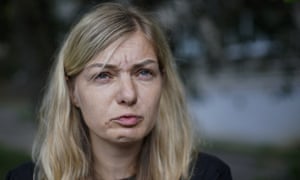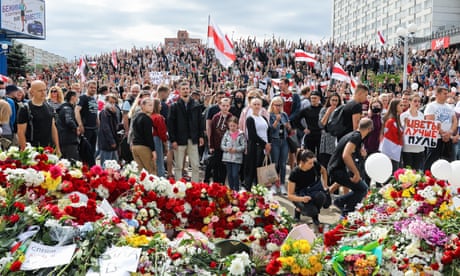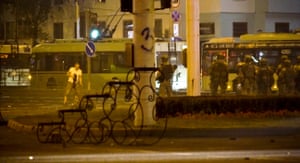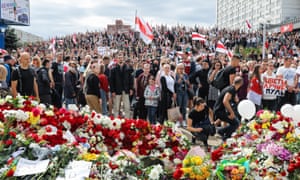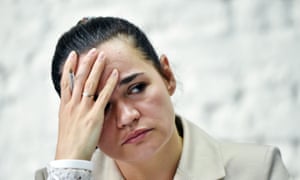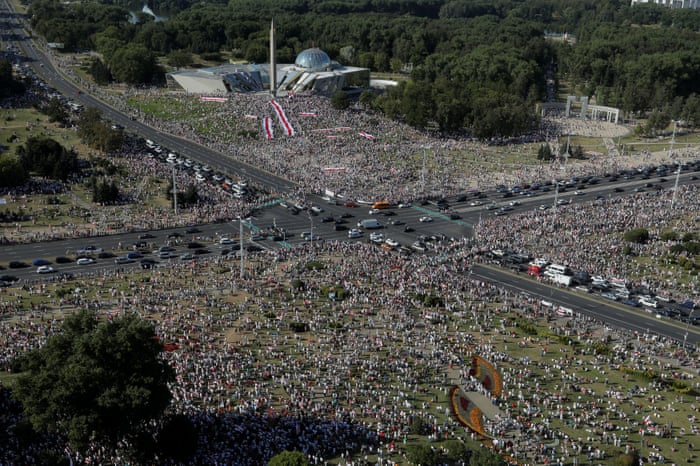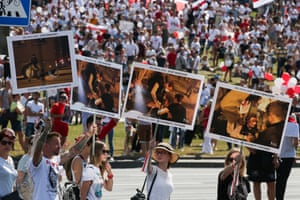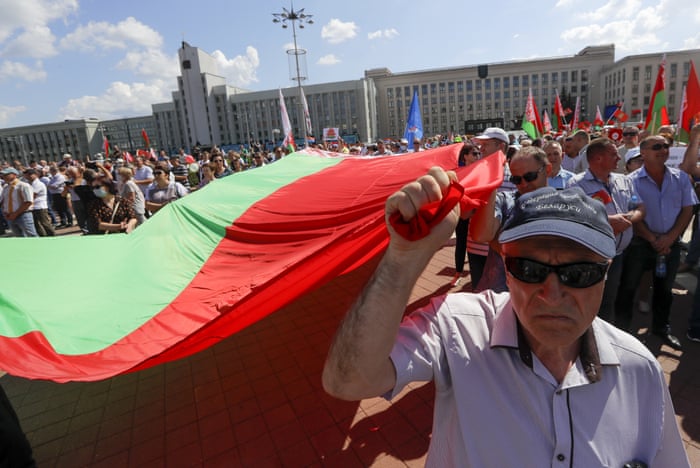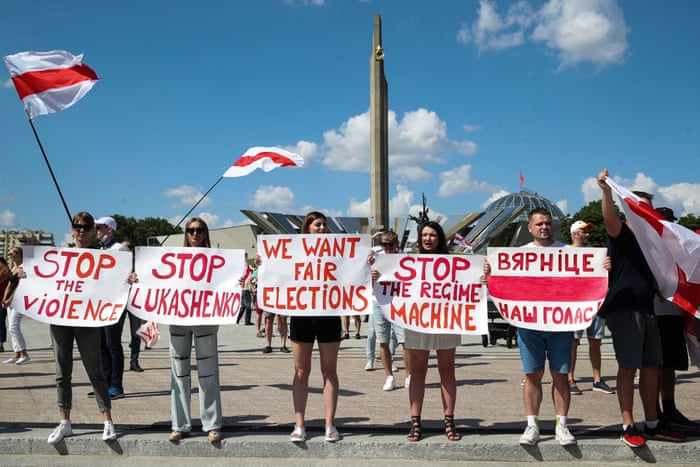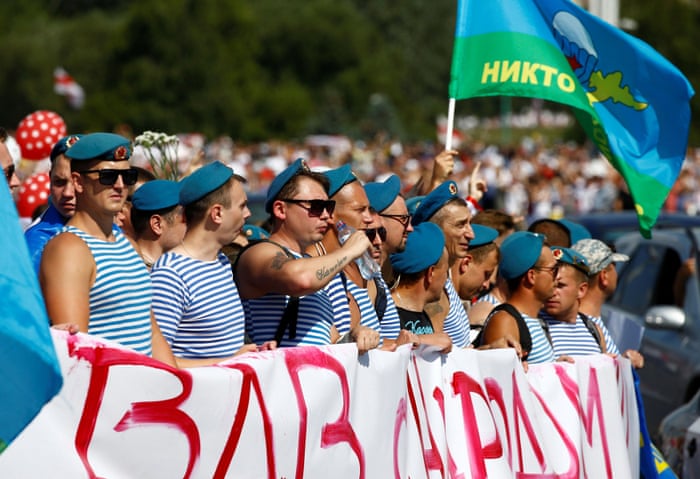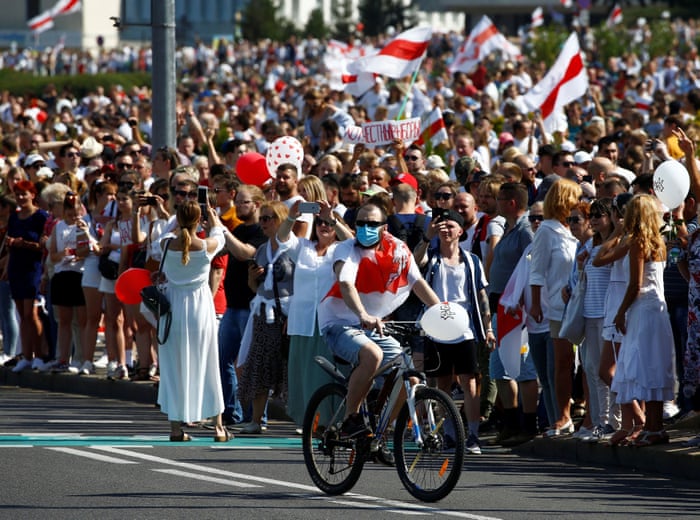WERE THEY DOING THE TARANTELLA
Issued on: 16/08/2020 -

The staff are all weating masks but it is harder to persuade the customers to observe the rules Andreas SOLARO AFP/File
Ostia (Italy) (AFP)
"Put your masks on!" repeats the DJ, shouting vainly into his microphone, but the dancers below, dripping in sweat, don't seem to care.
At the "Kiki" nightclub in Ostia, a popular seaside resort on the outskirts of Rome, the coronavirus threat seems both distant and yet very present.
During 50's night at this open-air disco on Ostia's beachfront, the rules are well known: a mask is mandatory, and dancing must be done at least one metre from a partner.
"Who cares about all that," laughed one partygoer, Claudio, his belly jutting forward and shirt wide open. With his mask in his pocket, he boogies alone, not to respect social distancing but because his friends are chatting elsewhere.
Around him, the approximately 200 to 300 party-goers dance to the blaring electro music, many without masks as they flirt, laugh and drink gin and tonics in the heat.
It takes the weary insistence of the staff, the calls of the DJ and a rumour of a possible police raid to get the crowd to comply begrudgingly and cover their faces.
- Party pooper -
While the threat of a second wave of coronavirus looms nearer in several European countries, such as Spain, Italy is trying to stem new infections in the middle of "Ferragosto", the sacrosanct holiday weekend of August 15.
Bonfires on the beach and a traditional midnight jump into the sea have been banned this year as arm wrestling between the government and regions goes on over the thorny issue of discos.
The topic is politically sensitive, as authorities don't want to appear to be punishing Italians during well-deserved summer holidays after a gruelling lockdown that was largely respected.
Inside-only nightclubs are still prohibited from operating, but regions have the discretion to open or shut open-air discos.
Calabria, for one, has ordered the closure of all dance venues while Sardinia has kept them open. Some, like Veneto to the north, have ordered reduced occupancy.
The sector employs nearly 50,000 people in 3,000 nightclubs around the country, according to the nightclub operators' union (SILB).
Despite any hit to the economy in keeping discos closed, health authorities acknowledge they represent a serious risk. A meeting on the subject between national and regional government representatives is scheduled for Sunday, according to Italian news wire AGI.
- Wild and free? -
Images of crowds of young holiday-goers dancing and drinking at night have been plastered on the front pages of Italian newspapers.
"The contagion is on the rise but we're dancing," proclaimed the Corriere Della Sera, which slammed Sardinia's clubs as being "joyful contagion machines".
At "Manila Beach" in Fregene, on the coast outside Rome, party organiser Gianluca Skiki said his venue, which normally welcomes up to 2,000 customers on its beach, has to make do with 250.
Despite some semblances of a nightclub -- a DJ, sequined miniskirts and high heels worn by some -- the experience appears odd. Couples sit at tables with distance between them to eat, and are instructed to dance only in front of their tables.
"If the police come, everyone has to be at their table," Skiki explained. "There's no real nightclub here any more, it's about the only thing we're allowed to organise."
He acknowledged the experience falls short of the carefree, wild parties of the past.
"I hope it will be the last of its kind..."
© 2020 AFP
Ostia (Italy) (AFP)
"Put your masks on!" repeats the DJ, shouting vainly into his microphone, but the dancers below, dripping in sweat, don't seem to care.
At the "Kiki" nightclub in Ostia, a popular seaside resort on the outskirts of Rome, the coronavirus threat seems both distant and yet very present.
During 50's night at this open-air disco on Ostia's beachfront, the rules are well known: a mask is mandatory, and dancing must be done at least one metre from a partner.
"Who cares about all that," laughed one partygoer, Claudio, his belly jutting forward and shirt wide open. With his mask in his pocket, he boogies alone, not to respect social distancing but because his friends are chatting elsewhere.
Around him, the approximately 200 to 300 party-goers dance to the blaring electro music, many without masks as they flirt, laugh and drink gin and tonics in the heat.
It takes the weary insistence of the staff, the calls of the DJ and a rumour of a possible police raid to get the crowd to comply begrudgingly and cover their faces.
- Party pooper -
While the threat of a second wave of coronavirus looms nearer in several European countries, such as Spain, Italy is trying to stem new infections in the middle of "Ferragosto", the sacrosanct holiday weekend of August 15.
Bonfires on the beach and a traditional midnight jump into the sea have been banned this year as arm wrestling between the government and regions goes on over the thorny issue of discos.
The topic is politically sensitive, as authorities don't want to appear to be punishing Italians during well-deserved summer holidays after a gruelling lockdown that was largely respected.
Inside-only nightclubs are still prohibited from operating, but regions have the discretion to open or shut open-air discos.
Calabria, for one, has ordered the closure of all dance venues while Sardinia has kept them open. Some, like Veneto to the north, have ordered reduced occupancy.
The sector employs nearly 50,000 people in 3,000 nightclubs around the country, according to the nightclub operators' union (SILB).
Despite any hit to the economy in keeping discos closed, health authorities acknowledge they represent a serious risk. A meeting on the subject between national and regional government representatives is scheduled for Sunday, according to Italian news wire AGI.
- Wild and free? -
Images of crowds of young holiday-goers dancing and drinking at night have been plastered on the front pages of Italian newspapers.
"The contagion is on the rise but we're dancing," proclaimed the Corriere Della Sera, which slammed Sardinia's clubs as being "joyful contagion machines".
At "Manila Beach" in Fregene, on the coast outside Rome, party organiser Gianluca Skiki said his venue, which normally welcomes up to 2,000 customers on its beach, has to make do with 250.
Despite some semblances of a nightclub -- a DJ, sequined miniskirts and high heels worn by some -- the experience appears odd. Couples sit at tables with distance between them to eat, and are instructed to dance only in front of their tables.
"If the police come, everyone has to be at their table," Skiki explained. "There's no real nightclub here any more, it's about the only thing we're allowed to organise."
He acknowledged the experience falls short of the carefree, wild parties of the past.
"I hope it will be the last of its kind..."
© 2020 AFP
Search Results
Web results
Jan 10, 2019 - When Dancing Plagues Struck Medieval Europe. The tarantella is named for a peasant woman from southern Italy whose tarantula bite started ...
Web results
Dancing mania was a social phenomenon that occurred primarily in mainland Europe between the 14th and 17th centuries. It involved groups of people dancing erratically, sometimes thousands at a time. The mania affected men, women, and children who danced until they ... The 1374 outbreak occurred only decades after the Black Death, and was ...
In the 16th century, the city of Strasbourg was struck by a "dancing plague" that ... A popular dance called the “Tarantella” was even said to have been created to ...
Jul 16, 2019 - ... Italian pizzica tarantella was the symptom of a terrifying malady, supposedly caused by a spider bite. Read on to discover the dancing plague ...
Nov 12, 2017 - Before the world was struck with Beatlemania--much, much before, ... to the years of Black Death, as the plague epidemic was dubbed. ... In Italy, a similar social phenomena called the tarantella was attributed to spider bites.
The Black Death, and The Dancing Mania - Project Gutenberg
The account of “The Black Death” here translated by Dr. Babington was ... in his red garments, he no longer listened to the tarantella of the musicians, but with ...
by JF Russell - 1979 - Cited by 37 - Related articles
still exists, as Raffe2 points out: "The Tarantella is danced in Sicily on every ... and armenian bole, commonly used in the treatment of plague and animal poisons ...Tarantella: listen to the dance of the spider's bite | Wellcome ...
blog.wellcomelibrary.org › 2014/04 › tarantella-listen-to-the-dance-of-the-...
Apr 11, 2014 - Tarantella: listen to the dance of the spider's bite ... In the fourteenth century wolf spiders were thought to be in plague proportions (Russell, ...
